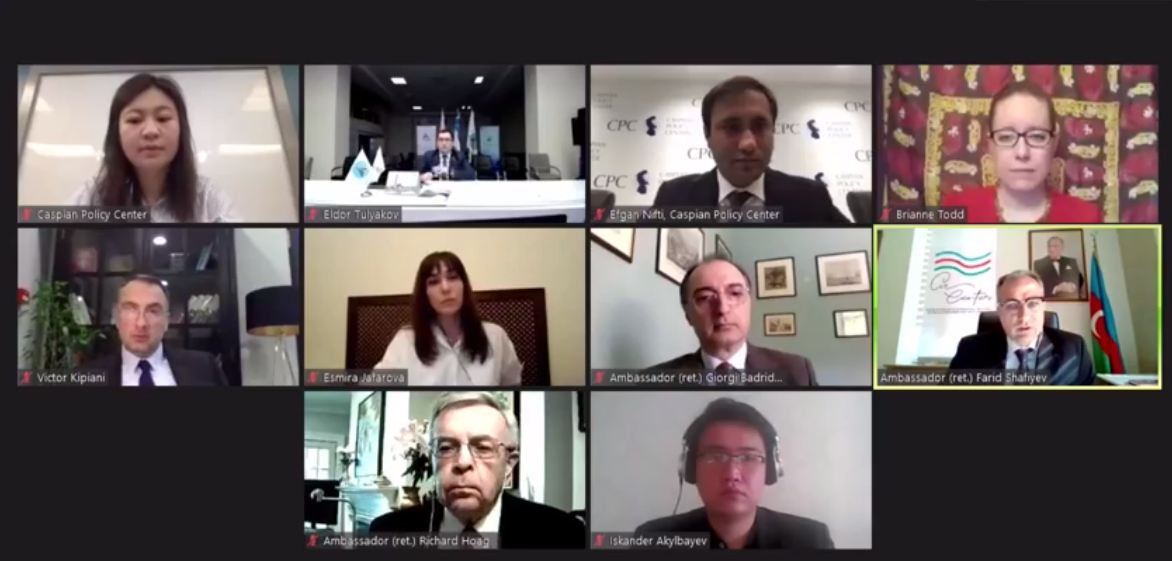Today, the Caspian Political Center, a partner of the Center of Analysis of International Relations in the United States, hosted a webinar titled “The United States in the Caspian Region: A Think-Tank Discussion”. Speaking at the webinar, moderated by a member of the Caspian Political Center ambassador Richard Hoagland, Chairman of the AIR Center board ambassador Farid Shafiyev said that the South Caucasus has long been of interest to many countries, especially Russia. According to him, after the collapse of the Soviet Union, along with Russia, Iran, Turkey and other countries, the interest of the United States and the European Union in this region has increased. Farid Shafiyev noted that the United States has pursued several major goals in the region since 1991-92. According to him, these goals were related to strengthening the independence of the newly independent countries, supporting the implementation of energy projects and the global war on terror: “But the role of the United States is diminishing within the region. It is partly due to internal domestic discussions within Washington about how much the US should be involved in different matters and what it should be prioritizing. The current administration increasingly speaks about withdrawing the United States from the Middle East and other regions. This trend will probably be seen in the South Caucasus as well. This is not only about the Trump administration. We have witnessed diminishing role of the United States since 2009-10. In fact, it would be unrealistic to expect the United States to be actively present in all regions. This requires serious military and economic resources”.
Farid Shafiyev also noted that the United States must make a choice of priority countries in the region. He noted that in this regard, Azerbaijan pursues a balanced policy and has the role of a bridge. At the same time, Farid Shafiyev said that the region's expectations from the United States are also related to the settlement of conflicts. He recalled the occupation of part of Azerbaijani territory: “The Armenian-Azerbaijani conflict is a serious threat to the region. Given the recent clashes on the border of North-West of Azerbaijan, this conflict does not only jeopardize peace and security, but also vital energy projects."
Board member of the AIR Centern Esmira Jafarova spoke about energy projects in the region and the role of the United States. According to her, since the first days of independence, Azerbaijan has shown itself as a reliable partner with the United States and other countries. She also added that Azerbaijan has established a successful energy partnership and the United States has supported these processes. In this regard, Esmira Jafarova highlighted the Southern Gas Corridor project: “This energy project promotes stability and cooperation, and the proceeds are used to increase Azerbaijan's economic strength. The project also stands as a valuable contribution to Europe’s energy security, diversification of sources and routes, as well as the continent's decarbonization efforts. Work on the four segments of the project has been successfully implemented and the SGC is scheduled to be fully operational this fall”. Esmira Jafarova said that the United States is an important partner in this project, and since the signing of the “Contract of the Century”, the country has supported the projects implemented by Azerbaijan, and expressed hope and confidence that this support will continue.
Speaking at the event, Ambassador Giorgi Badridze, an expert at the Georgian Foundation for Strategic and International Studies (Rondeli Foundation), said that the main purpose of US cooperation with the newly independent countries of the region is to support their independence and involve them in international projects. According to him, as a result of these projects, Georgia and Azerbaijan have found a place on the world map.
Iskander Akylbayev, executive director of the Kazakhstan Council on International Relations (KCIR), said that the role of the United States is declining not only in the region, but also in other countries. He stressed that in this regard, China has already become a new power.
Eldor Tulyakov, executive director of the Uzbek Development Strategy Center, said that the geostrategic interests of many countries in the Central Asian region, where his country is located, collide. He added, however, that Russia's position in the region remains dominant, and China's interest in the region has grown in recent years.
Brianne Todd, an assistant professor of Central Asian Studies at the Near East South Asia Center for Strategic Studies at the National Defense University, said the US’ position in various countries would change during the COVID-19 pandemic due to limited resources. According to her, the United States must make serious decisions on who to cooperate with in the future. She said that looking at Central Asia and the Caucasus, the United States will cooperate with countries that want to cooperate with it.
Speaking about the projects within the region, the chairman of the “Geocase” Center Victor Kipiani highlighted that a high level of interaction can be observed here. He said that the interests of other countries in the region should not be conducted in the form of dictating their interests over the countries of the region.
The webinar continued with a question and answer session.




